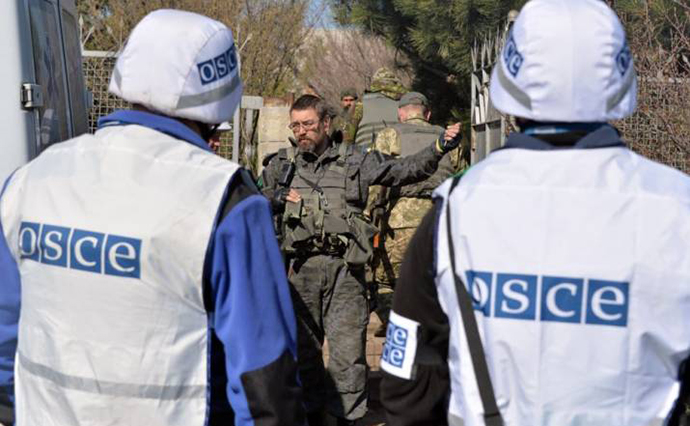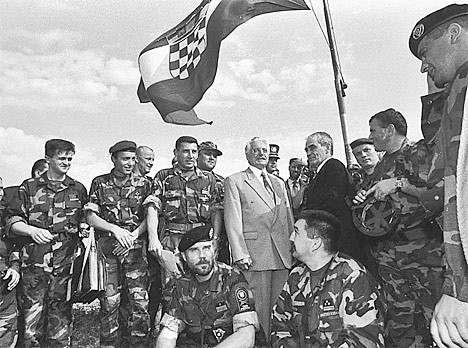While the special monitoring mission of the OSCE has played an at least ambiguous role in Ukraine, there are indications the organization’s leadership strives for greater projects.
Back in December 2014, Russia’s Foreign Minister Lavrov stated Russia planned to promote the idea of establishing a free trade zone between the European Union and the Eurasian Customs Union during the Organization for Security and Co-operation in Europe (OSCE) Ministerial Council meeting in the Swiss city of Basel. German Foreign Minister Frank-Walter Steinmeier also mentioned the idea of a dialogue between the EU and the Eurasian Customs Union during his November 2014 visit of Russia (see also here).
Also in Basel, OSCE‘s Chairman-in-Office, Swiss President Didier Burkhalter, had launched a OSCE Panel of Eminent Persons on „European Security as a Common Project“, in close cooperation with the OSCE chair Serbia (2015), and afterwards chair Germany (2016).
The panel has been headed by Wolfgang Ischinger who the German Spiegel has characterized as lobbying for a common security architecture including Russia (in 2012 he had proposed to build-up a common missile defense). The panel issued a report on European security at the end of 2015 (in English and Russian, among others urging the reestablishment of the NATO-Russia Council). It then met at the 52nd Munich Security Conference in February 2016, including Gernot Erler, Special Representative of the Federal Government of Germany for the OSCE Chairmanship, a special lobbyist for a „dialogue“ with Russia. OSCE’s General Secretary Zannier had found „The OSCE is perhaps a bit different from other international organizations in that we respect and openly recognize the existence of divergent perspectives. While accepting these differences, we try to build bridges and find common solutions to the challenges we all face […].“
Russia during the same Munich Security Conference had called for dialogue among equal partners. This has also well-fitted in the motto of the German OSCE Chairmanship – “Dialogue, Trust and Security” – which Lavrov found „completely conforms to the linetowards enhancing the OSCE role.“ Also in this regard OSCE’s Secretary General Lamberto Zannier was to participate in a security conference in Moscow in later April 2016.
Additionally, it can be observed that issues of security are increasingly linked to „economic connectivity“ and „free trade.“
In December 2015, for example, a conference took place in Vienna pushing the issue of „economic connectivity“ and looking for a role of the OSCE in it. „It was noted that, moving forward, discussions on this topic within the OSCE should involve the business community. This will be one of Germany’s priorities during its Chairmanship of the OSCE in 2016. It was noted that the recent report by the OSCE Panel of Eminent Persons included recommendations designed to increase the OSCE’s work in the field of economic connectivity.“
A joint statement of the OSCE Troika in April 2016 underlined the important role of the OSCE as a regional security organization, and pushed the idea of „economic connectivity“. The German chair of the OSCE organizes an economic conference in regard to „connectivity“ at the German foreign ministry, to take place in May 2016.
An important aspect of this „connectivity“ has been a free trade zone with Russia.
Efforts of Germany’s Foreign Minister Steinmeier to get Russia back into the G-8 and to push trough local elections in the Donbas despite of the de facto integration of the Donbas into Russian state structures can be regarded as part of plans to pave the road for a free trade zone with Russia.
Such a plan in January 2015 had also been supported by German Chancellor Merkel; another supporter has been Economic Minister and Vice Chancellor Sigmar Gabriel. He repeatedly requested to dispose of sanctions against Russia (here in autumn 2015).
During the annual assembly of the strongly pro-Russian German-Russian Forum in March 2016, Gabriel said the goal was to lift sanctions in summer 2016. He also announced a renewed dialogue with Russia, and that he and his Russian counterpart had already consented on reviving business relations (especially having North Stream-2 in view). Recently, the German „Ost-Ausschuss der deutschen Wirtschaft“, a powerful associations of business representatives that mainly propagates German trade relations with Russia,promoted the idea of a common free trade zone; its head Büchele finding the „crisis“ in Ukraine had made a common trade area between Vladivostok and Lisbon even „more urgent“.
So we now are back at the stage of Steinmeier’s request of a dialogue between the EU and the Eurasian Customs Union mentioned above.
The above developments highlight important issues:
- The OSCE is still looking for a bigger role in international politics – a new window of activity emerges with an increasingly weak EU (and NATO – reviving the NATO-Russian Council certainly does not support the strengthening of NATO, quite the contrary).
- German elites play a crucial role under the umbrella of the OSCE in order to push an exit-scenario if the EU should fail in order to ensure national German interests, which pretty much are economic interests.
Alarming is the belief of western elites that economic cooperation and dependence are sufficient in order to ensure wealth and security.
A document posted by the Valdai-Club gives more insights on how Russia sees the issue currently:
“Time has come to stand firm on making foreign trade issues largely an EAEU (Eurasian Economic Union) responsibility. We must work for the EAEU’s recognition by individual EU countries while Brussels is free to make its decisions on its own (…) The negative experience of the zero sum game that characterized all the numerous Russia-EU dialogues and partnerships until 2014 is bound to reproduce itself. This is why we must first lay a new foundation for these relations and openly discuss what we want from each other. We must definitely broaden our horizons on European security. Events of the past few years have proved that the issues of war and peace in Europe are too important to let Europeans deal with them single-handed. China, for one, is already a very keen player in Eurasia, of which Europe is part. Its trade and economic ties with the EU countries and economic presence in the EAEU states are growing. It is high time to ponder over new negotiating formats. We could speak about a new SCO-OSCE discussion platform in the future. Summing up these observations and ideas, it is important to say that Europe, Russia and our EAEU allies have entered a difficult and important stage in their development. The future of our common Eurasian home from Shanghai to Lisbon will depend on how they emerge from 2016. As for the central issue – direct contacts between the two unions – there is no rush. Eventually, if the leaders of the EAEU countries continue relegating their powers to supra-national bodies, Brussels will simply have no choice but to start cooperating with the Union. At this point, the young Eurasian bureaucracy will face a new and even more serious challenge: the need to deal with their seasoned and sophisticated EU colleagues. Let’s hope, however, that we will not need to worry about this until 2017.”








